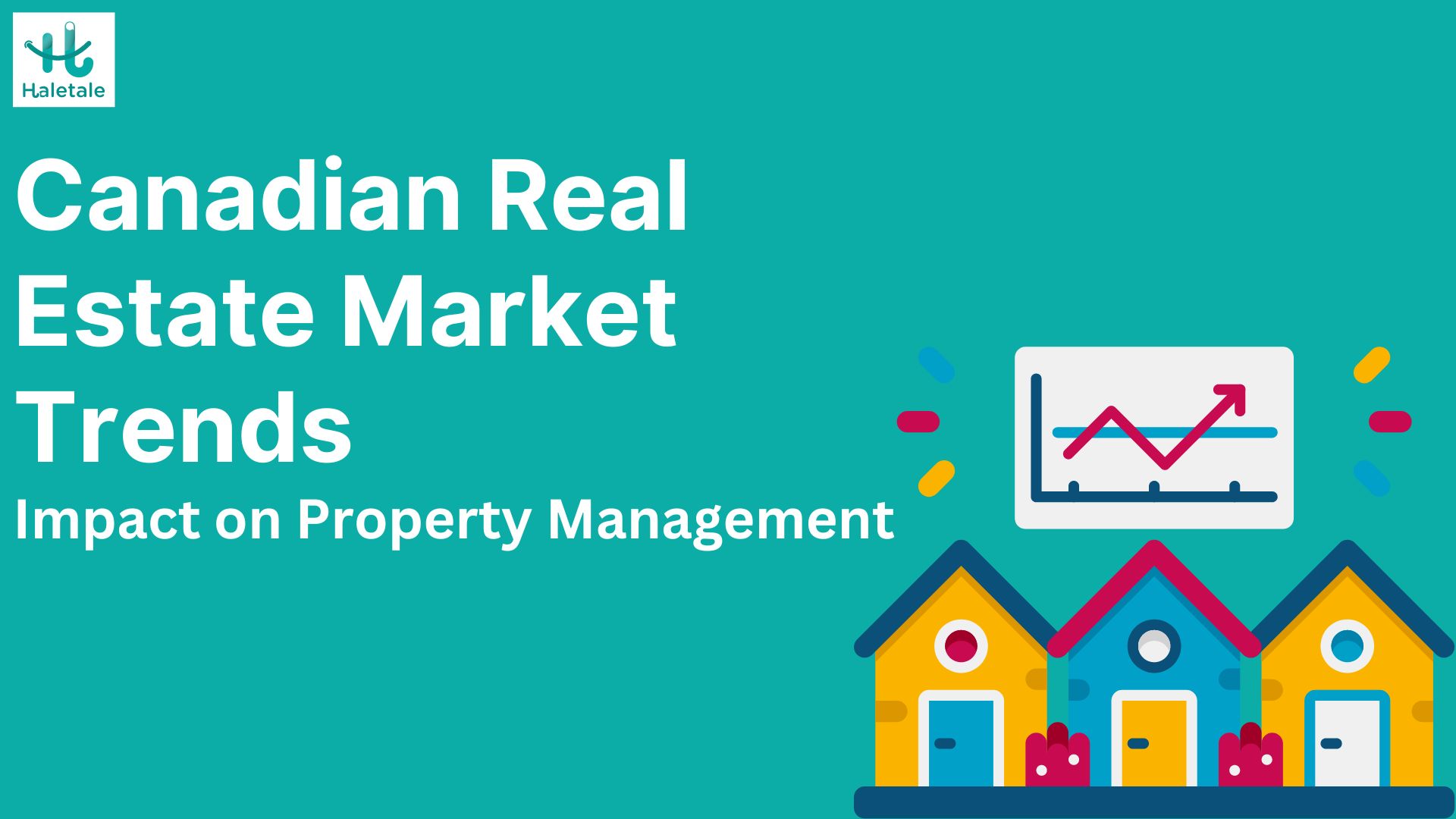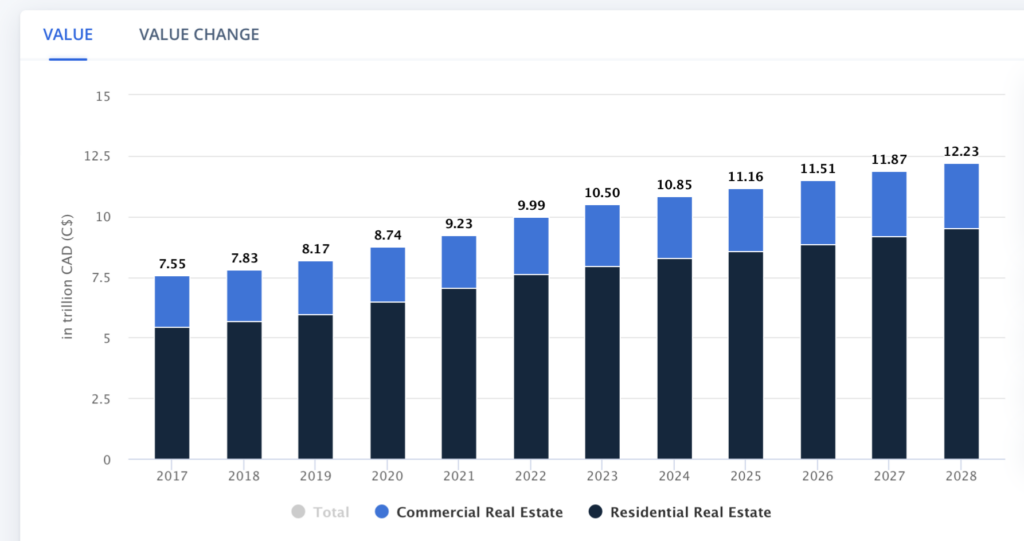The Canadian real estate market has undergone a fascinating period of change in the past few years. There has been a steady climb in property prices, led primarily by the residential real estate market. The average price of a residential building in Canada has gone up every single year from 2017 to 2024 and is projected to only go up from here looking forward. Rental prices in turn have also gone up, most substantially in the most metropolitan areas such as Toronto and Vancouver, but a steady rise in prices remains the norm across the nation. It has also become more expensive to build (residential and non-residential) in Canada than in previous years on record. There are multiple reasons for both these developments and understanding the key factors behind these trends is crucial for landlords and property managers alike. This article seeks to make clear the rationale behind these Canadian Real Estate Market Trends and clearly explain their significance to the realm of property management.
Real Estate Investment Trends in Canada
According to Statista, the Canadian real estate market is projected to reach a cumulative value of C$10.85 Trillion in 2024. Of this total, the residential real estate market makes the largest share, making up a volume of C$8.28 Trillion in 2024. This sector of the real estate market is projected to grow at an annual rate of 3.04% from 2024 to 2028, leading to a total market value of C$12.3 Trillion by 2028.
Based on this information, it is clear to see that Canada’s real estate market is experiencing a surge in demand and rising prices, as evidenced by the average home value price of C$740,000 in 2023. There are a number of factors affecting this significant market growth:
- Customer Preferences: The demand for home ownership in Canada is still quite high, with a rising number of these people wanting homes that are sustainable and energy-efficient.
- Increasing Property Prices: These can be attributed to: population growth due to immigration, limited housing supply in certain regions and lower interest rates. Metropolitan areas like Toronto and Vancouver have experienced a substantial growth in demand for housing, leading to much higher price increases than the rest of the country. This lack of supply has led to the rise in the demand for more multi-family/multi-tenant housing, as it meets the prospective renters at a price point they can more easily afford.
- Government Policies and Their Effects: Policies instituted by the Canadian government, such as Foreign Buyer Taxes and Mortgage Stress Tests (which, according to NerdWallet is a government rule that requires mortgage applicants to show they can afford higher payments if mortgage rates increase in the future.) . These rules have had the effect of reducing the number of foreign nationals and companies buying homes and also made Canadian homebuyers have to show they have the capacity to pay higher amounts for the homes they do buy.
Challenges and Opportunities for Property Managers
Adapting to Market Changes:
While it may feel like the real estate market events of the last few years have presented unique challenges for property managers, they also avail new avenues for potentially new revenue streams. The newer demand for eco-friendly homes for example, makes the property manager that is able to make their properties conform better to these new demands, a more attractive prospect for environmentally inclined customers. In order to more closely meet demand for these eco-friendly homes, property managers are encouraged to get their premises to conform to Canadian environmental certifications such as LEED (Leadership in Energy and Environmental Design) or EnerGuide
Technological Integration:
The advent of technology in the property management space has streamlined a lot of processes, making once tedious tasks such as move-in and move-out walkthroughs of a property completely seamless by enabling managers to upload photos of every inch of a property to a digital property management platform instead of tedious handwritten notes as it was done previously. Making use of IoT devices has also been a boon for property managers as they can now perform more predictive maintenance as they no longer have to wait for faults to occur before they get the facilities fixed.
These digital property management platforms provide wholly new avenues for data analysis on a scale that was previously impossible for property managers. Now, with the click of a button, insights based on data on the platform are available to you to make decisions that can maximize the revenue generation capabilities of your building. For example, by analyzing the tenant turnover rate in a particular facility, if that turnover rate is too high then it becomes evident that the rents being demanded may be too high and could do with a reduction. You can also look at renter feedback on a large scale, by analyzing renter feedback on surveys and finding similar trends which would give a holistic view of tenant sentiment,
Regulatory Compliance:
A crucial part of the job property managers do is to ensure that the buildings they manage comply with laws at every level of government. Federal-level housing policies such as the National Housing Strategy (NHS) have had a profound impact on property management in Canada. Rent control policies, like those instituted in Toronto, can limit the rates at which a property manager can increase rent prices, impacting year-on-year revenue generation. On the other hand, lower rental prices can lead to increased demand.
FAQs:
Q: How are current real estate trends in Canada affecting property management?
A: Property management in the Canadian real estate market has undergone a number of changes in recent times and it is crucial to be able to keep up with the current trends. The upward swing in property and rental prices makes it pertinent for property managers to be able to adjust their pricing strategies to ensure sustainable revenue over time, while remaining competitive with other facilities. The demand for eco-friendly homes or the inclusion of work-from-home amenities are some of the key factors shaping potential tenant expectations. In order to remain attractive on the market, property managers may need to upgrade their properties in order to align more closely with these changing demands. New regulations by the Canadian government such as rent control policies or sustainable housing incentives are major factors affecting property management practices. There is a need for property managers to stay up to date on these policies and get their facilities to comply with the changing legal requirements.
Q: What are the new challenges for property managers in the evolving Canadian real estate market?
A: Integrating technology into property management has numerous positives, but at the same time, care must be taken to not forget that as with anything connected to the internet, cybersecurity is a crucial part of operations. This can come in the form of ensuring that customer data security is high on the list of any digital property management solution being built or considered, privacy compliance (ensuring that data collected from tenants is abstracted where possible and Personally Identifiable Information is not accessible ).
It is also important to realize the importance of fostering positive relationships with both tenants at your property and the wider community as a whole. In order to maximize tenant happiness in particular, it is important to make sure their concerns are heard and addressed promptly. Doing this is a sure way to ensure tenant retention as they will feel satisfied with the services you are providing them, leading to stable occupancy rates and consistent rental income.
Lastly it is crucial to stay compliant with new and changing government regulations in the housing sector at the municipal, provincial and federal levels. Ensuring compliance with new environmental standards has become a key part of remaining in line with these regulations. A savvy property manager will take the time to learn what needs to be done to stay compliant with these new stipulations and make the necessary changes to the properties under their control. There might even be incentives tied to these new environmental laws and these will only increase the profit margins for that property.
Real Estate Market Predictions For Canada
- Sustainable and Eco-Friendly Facilities Become the Norm: Based on the aforementioned shift towards more sustainable and energy-efficient real estate facilities, it is likely that this will become more of the norm rather than the exception in the future. As a result, property managers should consider implementing more eco-friendly practices, adapting their facilities to meet sustainability standards and working more closely in line with established environmental regulations.
- Greater Integration of Technology: Digital property management solutions and IoT devices will become more present in homes, making it pertinent that property managers embrace new technologies to ensure tenant satisfaction, more efficient operations and making sure that their properties remain competitive on the market.
- Rising Construction Costs: According to Statistics Canada, construction labor has experienced significant shortages, leading to rising wage costs which has slowed down construction of new homes, as evidenced by a -8.2% decrease in new housing starts in 2023. Hence, property managers should expect maintenance and renovation costs to rise, requiring strategic planning and budgeting for property improvements.
Conclusion
The Canadian real estate market has seen a number of significant changes in recent times. A surge in demand has led to much higher property prices, customer demand for more eco-friendly homes is increasingly becoming the norm and government policies continue to shape what is and is not permissible. It is important to understand the factors behind the changing market trends, so as to be able to stay ahead of the curve. Property management has become increasingly intertwined with technology, with new tools and platforms being available to enable more efficient operations, data-driven decision making and providing a way to meet the demands of a large group of tenants at once. Being adaptable to the changes listed above, and more that will rise up over time remains the biggest path to long-term business success and will only increase the customer base for a savvy property manager.
In order to maximize long-term profitability and to understand the trends affecting the Canadian real estate market, it is important to stay informed. Speaking to property management professionals is also another way to obtain more tailored advice and will go a long way to provide interested parties with the advice they may need to get a high-level view of what is happening in the market.











